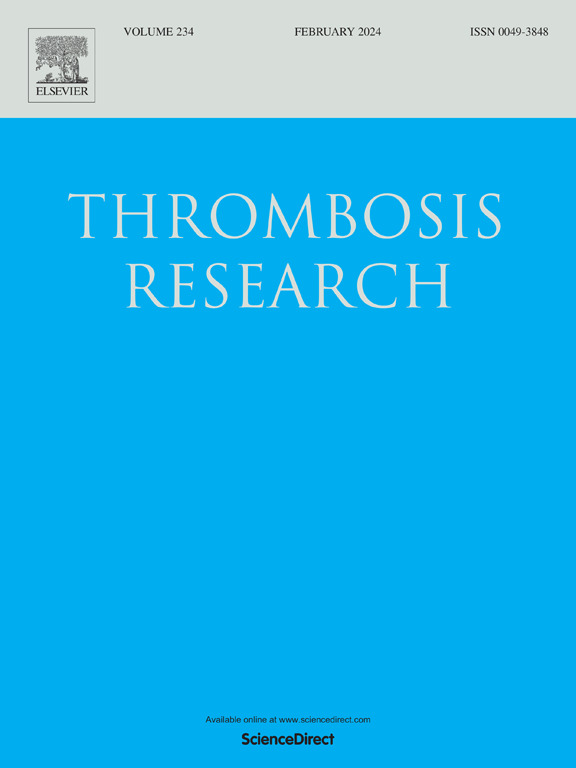他汀类药物治疗COVID-19住院患者的安全性和有效性:随机对照试验的系统评价和协作荟萃分析
IF 3.4
3区 医学
Q1 HEMATOLOGY
引用次数: 0
摘要
目的他汀类药物可能通过脂质介导和脂质非依赖性途径影响COVID-19的结局。然而,由于现有随机对照试验(rct)的有效性有限,他汀类药物治疗对COVID-19住院患者的临床影响尚不清楚。方法系统检索PubMed、Embase和clinicaltrials.gov,检索时间截止到2024年7月17日。如果将住院的COVID-19患者的他汀类药物治疗与对照组(安慰剂或标准治疗)进行比较,并纳入至少250名随机受试者,则纳入随机对照试验。在敏感性分析中考虑了联合治疗的研究。主要有效终点为30天全因死亡。主要的安全性结果是肌病和肝酶升高。结果3项随机对照试验(rct)纳入主分析(3882例他汀类药物初治患者,女性33.7%,平均随访时间37 d)。与对照组相比,他汀类药物治疗与全因死亡率降低相关(20.9% vs. 23.8%;优势比[OR]: 0.82, 95%可信区间[CI] 0.70-0.96; P = 0.01),肌病发生率虽小但显著升高(0.6% vs. 0%;风险差:0.00,95% CI -0.00; 0.01),肝酶异常发生率无显著差异(1.0% vs. 1.4%; OR 1.00, 95% CI: 0.25-3.99)。包括另外两项随机联合治疗的随机对照试验的敏感性分析得出了类似的结果。疾病严重程度(危重症vs.非危重症,P = 0.38)或性别(男性vs.女性,P = 0.83)对疗效没有显著的相互作用。结论在COVID-19住院患者中,与对照组相比,他汀类药物治疗与30天全因死亡率显著降低相关,并表现出良好的安全性。研究注册本研究已在PROSPERO注册(CRD42023478764)。本文章由计算机程序翻译,如有差异,请以英文原文为准。
Safety and effectiveness of statins in hospitalized patients with COVID-19: Systematic review and collaborative meta-analysis of randomized controlled trials
Aims
Statins may impact COVID-19 outcomes through lipid-mediated and lipid-independent pathways. However, the clinical impact of statin therapy among hospitalized patients with COVID-19 remains unclear due to the limited power of existing randomized controlled trials (RCTs).
Methods
A systematic search of PubMed, Embase, and clinicaltrials.gov was conducted through July 17th, 2024. RCTs were included if they compared statin therapy to control (placebo or standard care) in hospitalized COVID-19 patients and enrolled at least 250 randomized participants. Studies with co-treatment were considered in sensitivity analyses. The primary effectiveness outcome was 30-day all-cause death. The main safety outcomes were myopathy and rise in liver enzymes.
Results
Three RCTs were included in the main analysis (3882 statin-naive patients, 33.7 % female, average follow-up duration 37 days). Compared with control, statin therapy was associated with reduced all-cause death (20.9 % vs. 23.8 %; odds ratio [OR]: 0.82, 95 % confidence interval [CI] 0.70–0.96; P = 0.01), with a small but significant increase in myopathy (0.6 % vs. 0 %; risk difference: 0.00, 95 % CI -0.00; 0.01), and no significant difference in liver enzyme abnormalities (1.0 % vs. 1.4 %; OR 1.00, 95 % CI: 0.25–3.99). A sensitivity analysis including two additional RCTs that included randomized co-treatments yielded similar findings. There were no significant interactions for effectiveness by disease severity (critically vs. non-critically ill, P = 0.38) or sex (males vs. females, P = 0.83).
Conclusion
Among hospitalized patients with COVID-19, statin therapy was associated with a significant reduction in 30-day all-cause death compared with control and exhibited an excellent safety profile.
Study registration
This study is registered in PROSPERO (CRD42023478764).
求助全文
通过发布文献求助,成功后即可免费获取论文全文。
去求助
来源期刊

Thrombosis research
医学-外周血管病
CiteScore
14.60
自引率
4.00%
发文量
364
审稿时长
31 days
期刊介绍:
Thrombosis Research is an international journal dedicated to the swift dissemination of new information on thrombosis, hemostasis, and vascular biology, aimed at advancing both science and clinical care. The journal publishes peer-reviewed original research, reviews, editorials, opinions, and critiques, covering both basic and clinical studies. Priority is given to research that promises novel approaches in the diagnosis, therapy, prognosis, and prevention of thrombotic and hemorrhagic diseases.
 求助内容:
求助内容: 应助结果提醒方式:
应助结果提醒方式:


